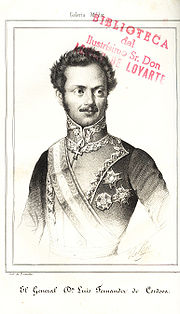
Luis Fernández de Córdova
Encyclopedia

Lisbon
Lisbon is the capital city and largest city of Portugal with a population of 545,245 within its administrative limits on a land area of . The urban area of Lisbon extends beyond the administrative city limits with a population of 3 million on an area of , making it the 9th most populous urban...
, April 22, 1840) was a Spanish military general and diplomat.
Hhe was the elder brother of Fernando Fernández de Córdova
Fernando Fernández de Córdova
Don Fernando Fernández de Córdova y Valcárcel, 2nd Marquis of Mendigorría , was a Spanish military, politician, and Prime minister of Spain for one day....
. An outspoken adversary of the Spanish Constitution of 1812
Spanish Constitution of 1812
The Spanish Constitution of 1812 was promulgated 19 March 1812 by the Cádiz Cortes, the national legislative assembly of Spain, while in refuge from the Peninsular War...
, he organized a rebellion against the liberal government on July 1822, and was forced to flee to France after its failure.
He returned one year later in the footsteps of the French army under Louis-Antoine, Duke of Angoulême
Louis-Antoine, Duke of Angouleme
Louis Antoine of France, Duke of Angoulême was the eldest son of Charles X of France and, from 1824 to 1836, the last Dauphin of France...
and participated in the restoration of the Absolute monarchy
Absolute monarchy
Absolute monarchy is a monarchical form of government in which the monarch exercises ultimate governing authority as head of state and head of government, his or her power not being limited by a constitution or by the law. An absolute monarch thus wields unrestricted political power over the...
of King Ferdinand VII of Spain. As a reward, he was named Spanish ambassador in Paris, Lisbon and Berlin.
After the King's death, he returned to Spain to support his daughter Isabel against her uncle Carlos
Infante Carlos, Count of Molina
The Infante Carlos of Spain was the second surviving son of King Charles IV of Spain and of his wife, Maria Luisa of Parma. As Carlos V he was the first of the Carlist claimants to the throne of Spain...
in the First Carlist War
First Carlist War
The First Carlist War was a civil war in Spain from 1833-1839.-Historical background:At the beginning of the 18th century, Philip V, the first Bourbon king of Spain, promulgated the Salic Law, which declared illegal the inheritance of the Spanish crown by women...
.
On December 12 1834 he led a Division under Rodil
José Ramón Rodil y Campillo
Don José Ramón Rodil y Campillo, 1st Marquis of Rodil and 3rd Viscount of Trobo, was a Spanish general and statesman, born in Santa María del Trovo, Galicia region...
and beat Zumalacárregui in the Battle of Mendaza
Battle of Mendaza
The Battle of Mendaza was an early battle of the First Carlist War, occurring on December 12, 1834 at Mendaza, Navarre.The Carlists had enjoyed a victory in the Battle of Venta de Echavarri in October and also the fruits of a raid on Navarre, in which Tomás de Zumalacárregui would station himself...
. Three days later he suffered a defeat in the First Battle of Arquijas
First Battle of Arquijas
-Opening shots:The battle began when Liberal forces found Carlist general Tomás de Zumalacárregui waiting at the bridge of Arquijas over the Ega River in Navarre; about the middle of the day, some gunshots were exchanged between the several advanced posts....
and was dismissed.
On June 24 1835, he was recalled and became commander of the North. He confirmed his reputation three weeks later by winning an important victory against general Vicente González Moreno
Vicente González Moreno
Vicente González Moreno was a Spanish general who supported the Carlists during the First Carlist War. He was appointed commander of Carlist forces after the death of Zumalacárregui....
in the Battle of Mendigorría
Battle of Mendigorría
The Battle of Mendigorría Grand was a battle of the First Carlist War. It occurred on July 16, 1835 south of Mendigorría, Navarre. The Carlists were commanded by Vicente González Moreno, who assumed this post after the death of Zumalacárregui at the Siege of Bilbao...
, earning him the title of Marquis of Mendigorria.
In August 1836, the progressives rebelled against the moderate government and Regent Maria Cristina
Maria Christina of the Two Sicilies
Maria Christina of the Two Sicilies was Queen consort of Spain and Regent of Spain .-Early years and first marriage:...
was forced to re-introduce the Spanish Constitution of 1812. General Córdova, together with senior government officials, then went into exile, and was replaced by Baldomero Espartero as head of the Army of the North.
He attempted a failed uprising in Seville in 1838, and fled to Portugal where he died 2 years later.

